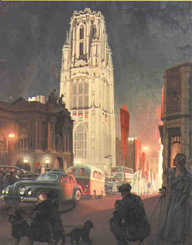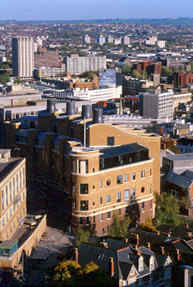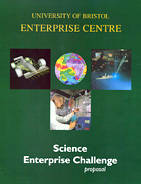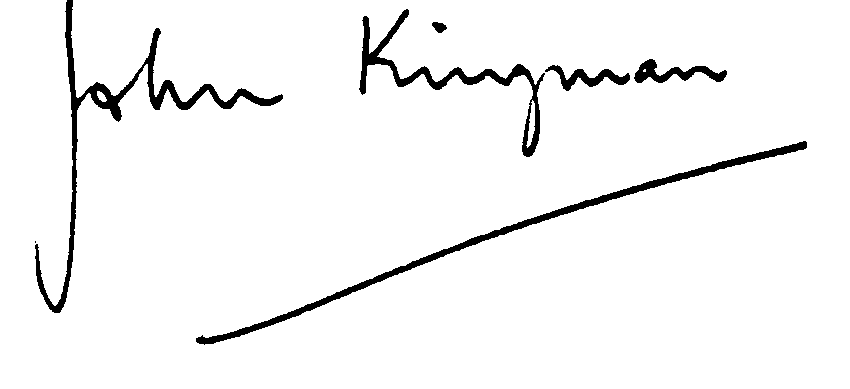Annual Report
1998-99
![]()

This year saw the 90th anniversary of the founding of the University and the granting of its Royal Charter. It also saw the 50th anniversary of the establishment of the Veterinary School. The former was marked by a reception at Goldney House, attended by the Lord Mayor and many other guests from the City and region, designed to reinforce the Universityís local roots. The latter was celebrated by a programme of popular and well-attended lectures with a veterinary theme and by a successful fund-raising campaign among Bristolís veterinary graduates. These anniversaries illustrate two of the major themes that today run through University strategy: the need to recognise local and regional links, as well as those that are national and international, and the increasing need for financial self-sufficiency, exemplified through our Campaign for Resource.
 |
Coronation Time: the Floodlit Tower of Bristol University, painted in 1953 by Clifford Hanney (1890-1990) |
The main text of this Report contains, as always, glimpses of the important research that goes on in all our disciplines. We are laying the ground for the next Research Assessment Exercise. This is due to take place early in 2001 and much of the work that will be considered must by now have been carried out or even been published. The University has been pursuing an active policy of concentration on its academic enterprise, ensuring that it makes good strategic appointments to various academic posts, that they are properly supported on the ground and that the administrative structures are in place to ensure that the University profits from its endeavours both academically and financially. Senate and Council have given their blessing to the Universityís Participation Strategy, designed to ensure that the University so broadens the span of undergraduate applications as to ensure that it captures even more of the best young talent across the country. The key to this is to seek out latent potential among those who might not have dreamed of applying to university, particularly to Bristol. There is no question of reducing the quality of our intake but rather of ensuring that we attract even more of the best. This Report refers to our Summer School, generously funded by Mr Peter Lampl, to links with local schools and to the strenuous efforts of the Studentsí Union.
Council has now given its approval to changes to the governance of the University designed, as recommended in the Dearing Report, to reduce the size of Council itself, to make plain that Council is unequivocally the governing body of the University while maintaining an interested and supportive Court, and to start the process of bringing the University statutes up to date. Discussions have been held at all stages with the Privy Council and the resulting proposals will be put, as required, to two meetings of the University Court this autumn.
 |
The new Synthetic Chemistry building takes shape; viewed from the top of the Wills Memorial Tower |
Ambitious academic programmes require buildings that are fit for the purpose. The new Synthetic Organic Chemistry building will be complete before the end of 1999, and is among the most advanced in any university. One consequence will be to free accommodation elsewhere in the School of Chemistry for use as teaching space for the School of Medical Sciences, thereby releasing urgently needed space for medical scientific research. Major refurbishment works have been carried out for the Department of Drama: Theatre, Film, and Television and for the School for Policy Studies. We have acquired the former Baptist College, right in the heart of the precinct, and it houses the Department of Archaeology and provides residential accommodation for the visiting Fellows of the Institute for Advanced Studies whose academic base is now in the refurbished Royal Fort House.
These developments require a sound financial base. The University achieved, as planned, a substantial financial surplus during the year and is budgeting for an even larger one in 1999-2000. Our Campaign for Resource continues to bring in large sums to the University. The current cumulative total is some £62 million and we are most grateful to Sir Michael Angus, to the whole body of Patrons and of course to the benefactors themselves, many of whom are our own graduates.
We are making great efforts to improve the recovery rates on our research work and to harness the full benefit of the intellectual property produced by our staff. Bristol Innovations Limited, our new vehicle for the purpose, backed by the staff of the Universityís Intellectual Property Management Unit, was healthily in excess of its business plan for the first year of operation.
| Our bid to the Science Enterprise Challenge was successful as was our application, jointly with Bath, for funds under the earlier University Challenge Scheme. Our successful Joint Infrastructure Fund (JIF) bid is described in the text. Many more have been prepared and are in the process of evaluation. |  |
None of this could succeed without the dedication of our staff, the advice and guidance of Council and the distinction of our students, to all of whom I extend my very warm thanks.
In particular I thank Michael Parry, who retired as Registrar in July after 33 years of distinguished service to the University. Michaelís career at the University has been one of selfless and unstinting commitment to the welfare of the institution as a whole. He has supported and helped countless individuals and causes, he has been a meticulous and devoted organiser of the administration of the University, and he has inspired loyalty and affection on all sides. His high standards, his attention to detail, his sense of occasion and tradition, his authoritative decisions, his ability to listen to a muddled argument and to grasp almost instinctively its salient points will be missed by the many who have sought his advice over the years.
We welcome Michaelís successor, Derek Pretty, who comes to the University with wide commercial and financial experience. He will find Michael a hard act to follow, but will make a distinctive contribution to the continuing success of the University.
 |
|
Sir John Kingman FRS
Vice-Chancellor |